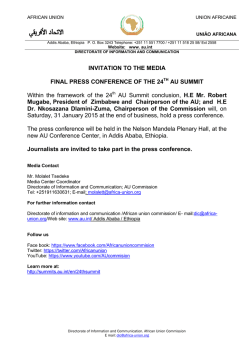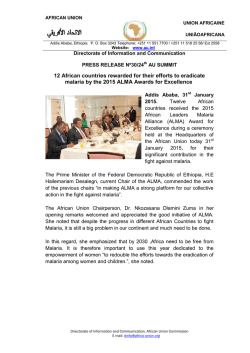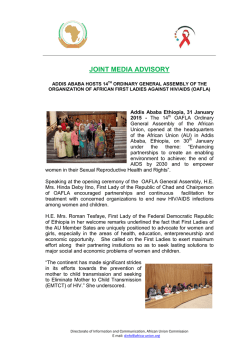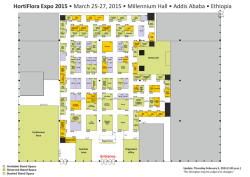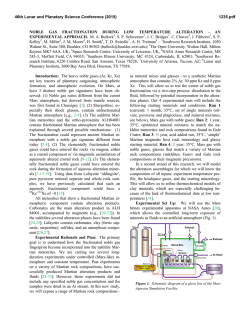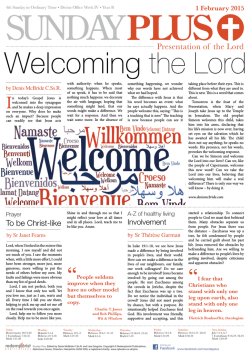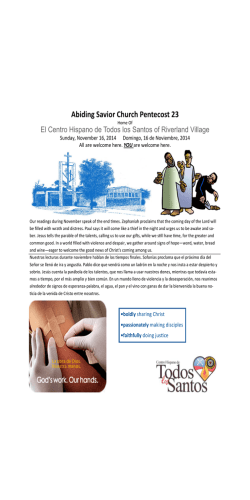
Eritrea and Ethiopia
Eritrea and Ethiopia Question for Short Debate Asked by Lord Chidgey To ask Her Majesty’s Government what assessment they have made of recent events in Eritrea and Ethiopia, and of their impact on migration to western Europe. Lord Chidgey (LD): My Lords, according to the UN refugee agency, in the first 10 months of 2014, the number of asylum seekers in Europe from Eritrea nearly tripled. In Ethiopia and Sudan, the number of Eritrean refugees also increased sharply. By November, some 37,000 Eritreans had sought refuge in Europe, compared with around 13,000 a year ago. Most asylum requests have been lodged in Sweden, Germany and Switzerland, with the vast majority arriving by boat from across the Mediterranean. Eritreans were the second largest group to arrive in Italy by boat, after the Syrians. An unprecedented number of Eritreans are fleeing their country as refugees, on a precarious journey to Europe as well as to bordering countries. As at mid-2013, the UNHCR estimated that the total population of concern originating from Eritrea was more than 313,000 people, including more than 292,000 refugees and 20,000 asylum seekers. 27 Jan 2015 : Column 176 Sheila Keetharuth was appointed special rapporteur on the human rights situation in Eritrea by the UN Human Rights Council in September 2012. Since then, she has made several requests to visit Eritrea; so far, her requests have been denied. She has nevertheless reported on the human rights situation in Eritrea. In her second report, in May 2014, she confirmed that violations included indefinite national service; arbitrary arrests and detention; extrajudicial killings; torture; infringement of freedom of movement, assembly, association and religious belief, and so on. In November 2014, the UN announced that the commission of inquiry into human rights abuses in Eritrea, established in response to the steep rise in migration out of the country, had begun operations. It is due to report in June 2015. A common argument from Eritrean pro-government supporters is that the exodus of Eritreans is due to economic pull factors. If this were the case, one would surely expect to see refugees from other developing countries fleeing in similar epic proportions. They clearly do not. On the other hand, there are apparently numerous human rights violations that incite Eritreans to leave the country. In this regard, the indefinite national service and arbitrary arrests and detention, or fear of them, are the top push factors for flight, according to the special rapporteur. According to reports from the UN Human Rights Council, Eritrea holds many detainees without charge or due process. Some have been in prison for more than a decade. Others have died in detention. Apparently, detention without recourse to justice is common in Eritrea, there being no avenues for detainees to submit complaints to judicial authorities, or to request investigations of credible allegations of inhumane conditions or torture. There is no independent authority serving on behalf of detainees. Furthermore, detainees and family members do not challenge, allegedly for fear of reprisals. The state does not investigate or monitor conditions in detention centres, nor does it appoint independent monitors to do so. The Danish Immigration Service undertook a fact-finding mission to Ethiopia, London and Eritrea in the autumn of 2014, publishing its findings and conclusions in November 2014. The conclusions of the report differed significantly from the body of the text in its interpretations of the causes of emigration, quoting information from UN agencies that could not be verified by the UNHCR. Supporters of the Eritrean Government have nevertheless quoted the report widely in response to concerns about the unprecedented number of Eritreans fleeing the country. The UNHCR published its concerns regarding the methodology used by the DIS, stressing that information ascribed to the UN in the report was not provided by the UNHCR, as inferred. Information provided by the UNHCR about Eritrean arrivals was not included; instead, the report relied on the speculative statements of others. In December 2014, the UNHCR published a detailed, point-by-point commentary and critique of the DIS report. It pointed out the absence of any information on regulatory frameworks for the media, NGOs, research institutes and other actors, and of any assessment of the reliability of information from those sources. It is understood that the DIS has withdrawn its report 27 Jan 2015 : Column 177 for further consideration. In the mean time, the 17 recommendations made to the international community in the first report of the UN Human Rights Council special rapporteur on Eritrea still stand. With regard to development co-operation, for more than a decade, the Eritrean Government have encouraged mining and exploration firms to participate in the exploitation of the country’s mineral resources. Although major firms have stayed away, possibly aware of the risk of complicity in human rights violations through the use of national service conscripts, a number of smaller firms have acquired mining and exploration licences. According to Human Rights Watch, those mining firms are walking into a potential minefield of human rights problems, particularly getting entangled with the Eritreans’ uniquely abusive programme of indefinite forced labour—the inaptly named national service programme. The programme was originally set at 18 months, but now requires all ablebodied men and most women to serve indefinitely, often for years with no end in sight, under harsh and abusive conditions. Some conscripts are assigned to state-owned construction companies, which have a complete monopoly in their field. International firms operating in the country are more or less forced to engage those companies as subcontractors, thus indirectly supporting a system of forced labour. The relationship between Eritrea and Ethiopia is arguably the most important and volatile in east Africa. The fall-out between the two former brothers in arms initiated a two-year long border war in 1998. Apparently triggered by a dispute over the border district of Badme, the war claimed about 100,000 casualties, cost billions of dollars, and remains the main source of instability in the region. Fighting ended with the signing of the Algiers peace agreement and establishment of the Ethiopia-Eritrea border commission in 2000. The commission delivered its delimitation decision in early 2002—importantly, placing Badme inside Eritrean territory. Initially, Ethiopia refused to accept the commission’s findings and refused to withdraw to the border that it had established, leaving thousands of internally displaced people in refugee camps. Ethiopia eventually accepted the commission’s ruling in 2006, but its implementation continues to be the source of severe tension between the two Governments. Indeed, the UN special rapporteur on Eritrea stated in her second report in May 2014 that she holds the view that border issues should not serve as an excuse for the Government of Eritrea to violate the rights of its citizens within its own territory. Furthermore, a sustainable peace is unlikely to emerge as long as conflict is seen solely in terms of border demarcation. The economic, political, cultural and historical links that bind the two states together should be the basis for a sustainable framework for peace. According to the Royal Institute of International Affairs—Chatham House—opportunities exist for external efforts to foster improved relationships. A fresh approach should involve engaging with each country separately, rather than immediately attempting to promote dialogue between them. 27 Jan 2015 : Column 178 Economic incentives are central to enabling improved relations between the two states, although prospective economic benefits from reopening the border are unlikely to be persuasive, given that they were unable to prevent the war. International engagement on areas of mutual interest could help foster a sense in Eritrea of stable economic sovereignty against Ethiopia’s economic predominance. Waiting for changes of leadership before making significant efforts to engage is, however, untenable, with no guarantee that successors would adopt a different foreign policy. In discussions prior to this debate, it has been claimed by Eritrean Government supporters that the Eritrean Government now plan to restrict national service to 18 months as set out in law, probably by the end of the year. I have also acquired a document issued by the Permanent Mission of Eritrea to the UN in New York. The document is entitled “Leaked Memo” and claims to reveal Ethiopia’s destabilising policy against Eritrea. It is apparently a translation into English from Amharic of a news item from the Shabait news agency website last February. I would be grateful if my noble friend the Minister could comment on these developments and perhaps give a considered response in due course. My noble friend will be aware that since December 2014 a number of responses have been given to Written Questions on Eritrea submitted by noble Lords, including the noble Baroness, Lady Kinnock. These have been commented on in the past but can my noble friend provide an update, for example on the outcomes of meetings of FCO and Home Office officials with Eritrean Ministers in December; on EU negotiations on policies towards Eritrea, to suppress the number of refugees from that country; and on the release of political prisoners in Eritrea since FCO officials raised the issue with the Eritrean ambassador in March 2004, considering that since then a new ambassador has been appointed? Lord Patten (Con): My Lords, migration from Ethiopia and Eritrea to western Europe can be understood only in relation to where those leaving go to. Take Ethiopia. Following my noble friend’s excellent speech and the point he made on Ethiopia, we must recognise, however, that that country is now host to more than 600,000 immigrants—the highest number of refugees taken in by any African country. The Government of Ethiopia should be highly commended for accepting and managing so many with such scant resources—and not attacked. The first question is where these refugees come from. A minority come to Ethiopia from sub-Saharan Africa—from countries even poorer than Ethiopia. Far more come from countries nearer at hand. A lot of Somalis, many more from the Sudan and more from Eritrea itself, of course, flood into Ethiopia. Then there is the huge number—more than 160,000—of recent returnee refugees: Ethiopians returning to Addis Ababa from Saudi Arabia since the amnesty there granted by the late King Abdullah ended. They, too, are often destitute when they arrive. Where do all these people go to if they try to get away from Ethiopia? The answer is that not all, by any means, go to Europe—that is a contemporary urban 27 Jan 2015 : Column 179 and media myth. Quite a lot travel south to South Africa. Ethiopia and its Eritrean refugees generate by far the largest number of migrants out of the Horn of Africa to the Yemen and through Djibouti. Certainly, some travel the western route, aiming north for countries such as Libya and thence to attempt those perilous sea crossings to reach the warm waters of southern Europe, before travelling further north. Far from all of them, however, come, or seek to come, to Europe. Vital work needs to be done to try to anchor people where they are in Ethiopia or Eritrea—to develop there a stable, trustworthy civil society within which sustainable local livelihoods can emerge. This does not need grand plans, geopolitical initiatives or great gestures, let alone a bunch of selfie-taking celebs jetting in and then, just as quickly, jetting out as soon as possible. Rather, it needs some money and lots of slogging, grinding hard work. Many are trying to do it. For example, there are three outfits in Ethiopia that I know doing just this, in the shape of CAFOD, the UK-based Catholic Agency for Overseas Development, and two sister—or brother— organisations of theirs from the Caritas network: SCIAF and Trócaire. They are all working to promote sustainable livelihoods and then to anchor the otherwise wannabe migrants, whether they are refugees in transit from the countries I have described or younger native-born Ethiopians seeking the somewhat illusory betterment that they think they might get abroad through migration. As it happens, my own daughter, Mary-Claire, is not long back from a visit to Tigray in northern Ethiopia, with CAFOD, for whom she works, happily just in time for this debate. She has told me what it is like on the Eritrean border, marked by just a line of straw across the asphalt track between the two countries. The programmes run by these three bodies have to date reached more than 65,000 people, more than 60% of whom are women and girls, which is much to the good. What do these programmes do? They provide training and support on business development and entrepreneurship skills to poor female and male farmers—former pastoralists—as well as to the urban self-employed, predominantly women and girls. They also help organise farmers into cooperatives and support groups and get the young training in business, finance, numeracy and literacy, and lots more. None of this is easy; nor is it easy at the moment for our own Government to deal with much of the raucous criticism of our taxpayer-funded overseas aid budget. I suspect but do not know that much of it, directly or indirectly, goes on trying to help people in the end to stay put and not to migrate—to be where all of us would want to be, at home if at all possible. I say to my noble friend the Minister on the Front Bench that figures are perhaps available. If figures to this end are available, they might persuade more of our fellow citizens that the overseas aid budget is well spent on trying to anchor the otherwise migrant-inclined. Baroness Kinnock of Holyhead (Lab): My Lords, I will briefly touch on the situation in Ethiopia. With an election looming there in May, we learn that its media 27 Jan 2015 : Column 180 are being decimated. The right to free expression continues to be denied and at least 60 journalists have fled the country since 2010. The reality is that the Ethiopian Government cannot tolerate independent voices being raised or information and analysis being disseminated. Intimidation, harassment, threats and unbearable pressure are put on those whose voices are raised against policies which threaten political opposition. Both Eritrea and Ethiopia have a Marxist-Leninist heritage. Ethiopia is still effectively controlled by the Tigrayan People’s Liberation Front, through a system of ethnic federalism. Although there has been some improvement we have to ask how it can be that, at the 2010 election, the EPRDF won 90% of the vote. At this stage, I particularly commend the work of Human Rights Watch, which argues relentlessly for recognition of the effects of the Ethiopian denial of fundamental rights and the need for its friends and donors to speak out on issues which are of life-and-death proportions to so many brave people. In 1988 I travelled to Eritrea, which was at war at the time with Ethiopia. Since 1962 they had been deadly enemies; tensions and conflicts have characterised all the years since. It was the longest running struggle for independence in Africa and was about independence from Ethiopia. As we know, the people of Eritrea continue to suffer and such is their desperation that they seek refuge in other countries, which can very mean long journeys. On the subject of migration, I begin with a shocking fact which serves to illustrate the desperation of Eritreans. Almost as many Eritreans fled their country—a country which, incidentally, is not at war—as Syrians fled theirs in 2014. UNHCR has said that: “From January to October 2014, more than 60,000 Syrians, including almost 10,000 children, arrived by sea. In the same period almost 35,000 Eritreans arrived by sea in the Mediterranean, including 3,380 unaccompanied children”. Surely, we have to ask exactly what makes people take such terrible risks to leave their country. The cruelty, tyranny and oppression of Isaias Afewerki and his regime know no bounds. Eritrea is isolated politically, regionally and internationally and it is under UN sanctions because of its alleged support for al-Shabaab in Somalia. The country is often described as Africa’s North Korea. All rights and freedoms are denied. There is no religious freedom or political pluralism, and no freedom of the media or of speech. The 2015 FCO report has given details of Eritrean abuses: arbitrary and inhuman detention, indefinite national service, lack of religious freedom, no job prospects and much more. Indefinite national service is clearly the main driver of migration. UNHCR has confirmed that young Eritreans are conscripted into endless military service characterised by harsh treatment. They are sent to work in gold and copper mines or to camp out on the Ethiopian border. National service should be limited to 18 months but conscripts are often held for as long as 20 years. Is it surprising that they are prepared to take such risks in the hope of a chance of a better life? The number of Eritreans seeking to come to Europe has nearly tripled over the last year and is mostly made up of very young refugees. The special rapporteur says that the authorities in Eritrea show no inclination to tackle the root causes of the 27 Jan 2015 : Column 181 exodus. She confirms a lack of rule of law, and reported cases of extrajudicial disappearances, arbitrary detention and torture in detention. Also, does the Minister agree with the suggestion made by some European Governments that it is necessary now to offer additional support and engagement to Eritrea, arguing that additional aid will lead to more openness and to change? Surely there can be no “new beginning”, as has been suggested, with this regime. As history proves, concessions to regimes such as Eritrea will achieve absolutely nothing. I ask the Minister to give some detail on the apparent willingness of the UK to have discussions with the Eritrean regime on, “drivers of irregular migration and ways to mitigate it, asylum and returns, and potential areas for joint co-operation”.—[ Official Report 6/1/15; col. WA 136] What exactly does that mean? Will the UK delay any response on refugee policy until the UN commission of inquiry issues its report on the subject? European Governments should not make major Eritrean policy changes until they see the inquiry findings. Let us see if Eritrea is prepared to cooperate with the UN commission of inquiry before taking any hasty decisions. Now there are signs of unbelievable courage and determination in Eritrea on challenging Isaias Afewerki. The people are aware of the dangers of open protest, but we have to ask just how long they—and he— can hold on. We must urge the EU and others to make sure that the UN commission is given clear and urgent access. Isaias Afewerki’s agreement to co-operate would be the first test of whether he is ready to accept change. Whatever happens, if there is negotiation, the European Union and member states must not make quick concessions but use any momentum to ensure that there can be—and will be—fundamental change. The release of Dawit Isaak would be a welcome and symbolic victory. My final point relates to what are routinely called “irregular migrants”. These people arrive in Calais having endured a terrifying journey and are then treated as if they are economic migrants. This is clearly not what persuades them that they must leave Eritrea. Many other African countries are just as poor as Eritrea, but their citizens do not come to Europe in their thousands, as they do from Eritrea now. Will the UK argue for their right to stay and ensure that they are treated as refugees? Lord Avebury (LD): My Lords, I warmly congratulate my noble friend Lord Chidgey on securing this short debate that links Eritrea and Ethiopia, and on his masterly summary of the human rights violations in Eritrea and the consequent exodus of large numbers of refugees. The two countries were linked in a forced marriage when the UN organised a bogus test of public opinion in Eritrea and imposed a federal union of the two countries in 1952, followed 10 years later by Emperor Haile Selassie’s annexation of Eritrea. There followed a 30-year war of liberation to restore Eritrea’s independence. 27 Jan 2015 : Column 182 In the 1970s, I was chairman of the Eritrea Support Group, which campaigned in Parliament and the media for Eritrea’s freedom and tried to persuade Ministers to support the self-determination of the Eritrean people, sanctioned by international law. Ministers would always reply with the mantra, “We believe that a federal solution would be best for the people of Eritrea”. I tried to ask them how they dared to usurp the right of the people themselves to exercise the most fundamental right of all peoples, emphasised by its position as Article 1 of the International Covenant on Civil and Political Rights. In 1981, I visited Eritrea at the end of the Ethiopian sixth offensive. I travelled by Port Sudan through the desert and then along the Freedom Road, which was blasted out of the rock, up into the highlands, where I stayed at the Nacfa Hilton, a cave behind the front line. At dawn we saw the Antonov bombers dropping their loads on the ruins of Nacfa, in which the only building standing was the tower of the mosque. The corpses of Ethiopian conscripts killed in a hopeless attack on the cliffs protecting Nacfa were still lying where they had fallen, testifying to the futility of the Dergs’ colonialism. In 1993, after the Eritreans gained their freedom, they held a referendum, in which there was a 99.3% turnout, in favour of independence, an event that no one who was there could ever forget. There was a spontaneous outburst of joy, with singing and dancing in the streets, and it seemed as if Eritrea, with its talented and hard-working people, would become a beacon of democracy and prosperity in the Horn of Africa. However, that dream was shattered when Ethiopia launched a fresh war of aggression on the pretence of a dispute over the border between the two countries. After tens of thousands of lives had been lost on both sides and hundreds of millions of dollars had been spent on sophisticated weapons, it was agreed to refer the demarcation of the boundary to a commission headed by the distinguished British jurist Sir Elihu Lauterpacht, who was a schoolmate of mine 66 years ago. Both countries had agreed to accept the commission’s decision as final, but when the details were published in April 2002, Ethiopia found one excuse after another to dispute the findings. Ostensibly, its main reason was that the commission had awarded the small town of Badme to Eritrea, but as it had no significant value there must have been other reasons. The suspicion is that the long-term objective of Ethiopia is to re-annex its former dependency and, meanwhile, to weaken it by threatened aggression along the border and working to intensify sanctions on false charges of supplying weapons to the alShabaab terrorists in Somalia. The Ethiopians unlawfully occupied territory all along the border that should have been demilitarised under the settlement, and Eritrea has been forced to maintain large armed forces as a precaution against further military attacks by its bullying neighbour. That was its justification for the much criticised imposition of indefinite military service, which was mentioned by my noble friend. The Eritrean ambassador told us that from last November conscription was limited to 18 months and that conscripts would not be required, as before, to perform civilian work such as road building, earning no more than $30 a month. Thousands of young people 27 Jan 2015 : Column 183 are fleeing the country every month, and Eritreans are the most numerous of those attempting the risky crossing from north Africa to Europe in which so many lose their lives. There is hope now that the flood of Eritrean asylum seekers will abate and that the colony will receive a boost from the extra labour in the private agricultural sector from the release of the indefinitely conscripted young people in the system. The permanent existence of a state of “no war, no peace” is a major reason for the plethora of human rights violations by Eritrea, which have been mentioned by both my noble friend and the noble Baroness, Lady Kinnock. These include the arrest and disappearance of 21 opponents of the Government in 1991, arbitrary arrests and severe restrictions on freedom of expression and assembly. These are undoubtedly seen by the regime as necessary protections against their unscrupulous and determined enemy. That is not to defend such practices but to make an observation. Does the Minister not agree that, if the threat of aggression were lifted, violations of human rights would diminish and the flow of refugees would be further reduced? Trade between the two countries and access by Ethiopia to the ports of Assab and Massawa would boost economic activity throughout the region and lower unemployment locally and internationally, thus reducing the incentive to emigrate. Ethiopia, on the other hand, has no enemies in the region and therefore has no reason for the severe restrictions on freedom of expression that it imposes. Human Rights Watch said last week that 22 journalists, bloggers and publishers were charged with criminal offences in the past year, Six independent publications were intimidated and closed, with dozens of staff forced into exile. Three owners of publications also fled abroad to escape false charges that led to sentences of three years in prison in absentia. Six members of Zone 9, a bloggers’ collective, were charged under the counterterrorism laws and have been in custody for 274 days, sending a chilling message to online activists. Can the Government not make representations to Prime Minister Desalegn to relax the stringent controls on freedom of expression so that Ethiopians can have a genuine election in May? Above all, I call on the Government, and through them the EU, to launch a new diplomatic effort for peace in the region—for Ethiopians of all political parties to accept the Lauterpacht settlement unequivocally and to withdraw their forces from Eritrean territory. The Lord Bishop of Derby: My Lords, I, too, thank the noble Lord, Lord Chidgey, for his comprehensive and challenging analysis and assessment. I will make some general remarks and then one or two specific points. This complex situation is partly because the region is very unstable and there is a lot of movement from both of these countries to Saudi Arabia and the Yemen, as well as to Europe. Such an unstable context requires some big picture approaches. Then there is the conflict between Ethiopia and Eritrea, as the noble Lord, Lord Avebury, has clearly explained. That complexity makes a neat solution very difficult. 27 Jan 2015 : Column 184 We have heard something of the human rights abuses. We need to put firmly on record in this House the particular suffering of women and girls, not least through military service, through trying to avoid military service by escaping into marriage and getting married at a very young age. There is also the problem of religious freedom in Eritrea. The constitution there guarantees religious freedom but only four groups are allowed to worship—Orthodox Christians, Catholics, Sunni Muslims and Lutheran evangelicals. Any mature country in that region needs to honour the spirituality and aspirations of its citizens. We are told that 4,000 people a month are fleeing from Eritrea into Ethiopia, which further complicates the dynamic between the two countries. Because many who flee are women and children and unaccompanied minors, they are ripe for what we call human trafficking. Many of them are picked up and exploited by labour gangs for sexual slavery and even for body parts. The noble Baroness, Lady Kinnock, spoke of their sheer desperation and desire to escape. In Matlock, in the Peak District of Derbyshire, you might think that you could not be further from Ethiopia and Eritrea. However, when a couple who had driven back from the continent in a campervan arrived in Matlock, out from underneath crawled a refugee. He had had a desperate experience and was shaking, crying and happy to be turned in to the police. This tragic vignette illustrates the issue. I am privileged to be a trustee of Christian Aid, which, along with CAFOD, is working on the ground in Ethiopia. It has been there for 30 years. It started by engaging with emergency work and is now doing very important development work with HIV, malaria, maternal and child care and especially the safeguarding of the rights of women and girls and of their educational development. I tell noble Lords that in part because it is a sign of hope, but Christian Aid—and possibly CAFOD, too—does not work in the north of Ethiopia or in Eritrea. It cannot get access to do that voluntary work; often we can work with partners on the ground, growing capacity, but Eritrea and the north of Ethiopia is a no-go territory because of the chaos. That means that the partnership that government can often assume from the voluntary and faith sector is not able to operate, which is a further challenge and complexity. The number of migrants we experience in western Europe is simply a cry for help, showing us the scale and seriousness of government malfunction and the complexity of the history we are looking at. Therefore, there has to be an approach that is not just bilateral, with these countries trying to work with their difficult histories and tensions. Rather, we have to ask our Government to work with the EU, the UN and through the Foreign Office, and to try not just to look at the political possibilities but to engage with the voluntary and faith sectors to work with the desperate need on the ground, especially in northern Ethiopia and Eritrea, where there is all that suffering and no real access to giving help. Therefore, I will be interested if the Minister can comment on the overall strategy and on how working with Europe and the UN might give some hope, besides bilateral things; on any representations on honouring religious freedom in Eritrea; and on how 27 Jan 2015 : Column 185 voluntary and faith groups might assume the partnership they often have with Governments in other needy areas to some offer support and development on the ground within the context of that complex political situation. Lord Rea (Lab): My Lords, I am very grateful to the noble Lord, Lord Chidgey, for securing this short debate. I thank the noble Lord, Lord Avebury, for introducing me to Eritrea in the year 2000 during a lull in the war with Ethiopia. In the next phase of the war the Eritreans did not do so well; it ended in a rather unsatisfactory ceasefire a year or so later. The subsequent developments in the economically damaging state of “no war, no peace”, were described extremely well by the noble Lord, Lord Avebury. The unresolved border tension, as several noble Lords have said, is having a major impact on Eritrea’s economy—less so, I guess, than in Ethiopia, which has a much bigger population. The standing army that Eritrea maintains is a major drain on a country with only 3 million people. When we were in Eritrea, we visited, among other places, the Red Sea port of Massawa, where we met the Minister for the coast and fisheries, Petros Solomon, an impressive former senior officer in the independence struggle. He took us to see a remarkable coastal prawn and tilapia aquaculture pilot project, which was being developed with the help of a small American grant. If that project had gone ahead and expanded it could have become a valuable food-producing and export industry. Sadly, it was abandoned a year or so later, possibly due to government opposition to external NGOs. In 2001, I was among those invited to attend the 10th anniversary celebrations of the end of the independence struggle. Among other visits we were taken by helicopter to the former battleground of Nakfa, which the noble Lord, Lord Avebury, described. We were impressed by the ingenuity and courage of the Eritreans and their capacity for hard work. However, shortly after our visit, 15 senior government members, known as the G15, who had signed a letter to President Isaias Afewerki urging him to implement the agreed democratic constitution and hold elections, were all arrested. They included Petros Solomon, whom the noble Lord, Lord Avebury, and I had met one and a half years earlier. Some 13 years later, he is still in prison, without trial and held incommunicado, as is his wife. Can the noble Baroness, to whom I gave notice of this question, say whether our embassy has been able to obtain any information about this man and his colleagues who are still detained? Some fear that he and some of the other G15 letter writers may no longer be alive. There are other long-term political prisoners, including a number of journalists known as the 31, whose fate is unknown, and there are almost certainly many more. Human Rights Watch and Amnesty International have condemned these and other arrests and disappearances, as the noble Baroness is fully aware. As all other speakers have said, there is compulsory conscription for national service and not all of it is military. Some consists of what could euphemistically be called vocational training, but pay is very low—pocket money if you are 27 Jan 2015 : Column 186 lucky. There is also a large standing army which has to be maintained because of the tension with Ethiopia and which the country can ill afford. It is alleged that many national service recruits are being used as virtual slave labour, in poor conditions in ore-producing mines. The Eritrean Government deny this. Does the noble Baroness have any information on this? According to an independent report by the Danish immigration service, the reason given by most Eritrean asylum seekers for leaving the country is economic rather than political, although deserters from national service naturally fear punishment if they return. As noble Lords have said, this report appears to have been withdrawn. Other noble Lords have testified to the important part played by human rights abusers in the exodus of Eritreans. As we hold this short debate, there is a UN human rights commission of inquiry going on. It was not allowed into Eritrea itself, so it has, apparently, had to rely on external testimony. Does the noble Baroness have any information on the progress of this inquiry? Other informants give another, rather more hopeful, side to the story. There is grass-roots development and, within limits, considerable local democracy. As can be imagined, this does not include criticism of the president who, like President Putin, is unaccountable but still apparently popular, despite having lost the war with Ethiopia and heading an autocratic regime. As in Russia, support for the president is strongest in provincial and rural areas. In part, this is due to the policy of land reform which grants land—all of which is state owned—to landless farmers on equitable long-term leases. WHO and UNDP have praised the effectiveness of Eritrea’s antimalarial programme and its collaboration with external advisers in public health. It has achieved the millennium development goals in education and maternal and child health. This information comes, not just from the Eritrean Government, but from United Nations agencies. Its expansion of free education and healthcare is well ahead of most other countries in Africa. Eritrean support of al-Shabaab in Somalia is denied by the regime’s supporters who say that, in fact, Eritrea has its own jihadist problem. Does the noble Baroness have direct evidence of this alleged Eritrean involvement in Somalia? Could this possibly be Ethiopian propaganda? Eritreans are intensely proud people and respond negatively if told what to do. They are determined to pull themselves up by their own bootstraps— hence their rejection, often to their own detriment, of many projects by aid agencies, whether official or non-governmental, and their stringent conditions for accepting much needed inward investment. They are determined not to be exploited by multinational corporations. It would be very useful to hear what the UK’s experience of investment in capital projects has been in Eritrea. I suggest that, as with other long-drawn-out conflicts, discussion, initially perhaps behind closed doors, is more likely to lead to an acceptable outcome than open confrontation or sanctions. Having said that, political prisoners such as Petros Solomon, of whom I spoke, must be released, or at least be tried in open court. Their continued detention without trial and the failure to implement independent Eritrea’s agreed 27 Jan 2015 : Column 187 democratic constitution are major factors blocking the development of normal relations between Eritrea and the rest of the world. Baroness Morgan of Ely (Lab): My Lords, I congratulate the noble Lord, Lord Chidgey, on securing this very important debate, and particularly on his illuminating introduction. The tragedy unfolding in Eritrea and Ethiopia is impacting directly on us here in the UK and across the EU, and the picture painted by the right reverend Prelate tugs at your heartstrings. It is another example of how we cannot isolate ourselves from the problems of the world; we cannot haul up the drawbridge and hope that the situation will go away. Hundreds of thousands of innocent people are desperate in both these countries: so desperate that they are prepared to risk everything—and I mean everything—to start a new life, not just here in Europe but in other African countries, too, as noble Lords have said. There is no doubting the seriousness of the situation, particularly in Eritrea. As has been suggested, Eritreans and Ethiopians are the main nationalities of the irregular migrants seeking asylum in the EU, apart from Syrians. They come either by land, normally through Lebanon and Syria into Turkey and the western Balkans, then on to the EU, or by sea, often using Tunisia or Alexandria in Egypt as their key point of departure. I ask the same question as that asked by my noble friend Lady Kinnock: what are they fleeing from? What is driving this mass exodus, which includes not just women and children but thousands of unaccompanied minors? The simple answer is that neither Ethiopia nor Eritrea is a functioning democracy. Although both Ethiopia and Eritrea are suffering real problems, there is more scope to influence activities in Ethiopia. In the past, there seems to have been a modicum of free speech and a free press in Ethiopia, although the Government’s intolerance of dissent seems to be increasing significantly in the face of general elections in May. There have been large-scale arrests of protesters and a crackdown on opposition opponents. This is particularly true in the Oromo region, where at least 5,000 people have been arrested as a result of their opposition to the ruling party. But if we think that the situation is bad in Ethiopia, it is truly catastrophic in Eritrea, where all freedoms were suppressed in September 2001. There is no religious freedom, as the right reverend Prelate underlined, no political pluralism, and no independent press in the nation. The forced and interminable military service to fight the unending border war with the neighbours in Ethiopia is clearly a real problem that is driving people from the country. There are some key points which we would like the Government to take on board. We believe that all possible pressure should be brought to bear in particular on the Eritrean regime to give way to a democratic Government who will respect human rights and the wishes of their people. What this does not mean is attempting to start a new relationship with the existing Eritrean authorities through providing unconditional 27 Jan 2015 : Column 188 aid. Given the failure of all previous attempts to engage in a meaningful way, do the Government really believe that the regime can respond positively? Do the Government agree that, unless there is clear and verifiable evidence that human rights in Eritrea have improved, there should be no new beginning with the regime? I understand that the United Nations Commission of Inquiry on Human Rights in Eritrea will visit the UK this week to hold meetings and collect testimonies and accounts on the human rights situation in Eritrea. Can the Minister give an assurance that the Government will support the UN in its work and ensure that an objective picture of the situation in the country can be assembled? We are all aware that there are fears and concerns within the British population about the scale of immigration to the UK. Such a fear is not just here in the UK, but true across the EU. We need to ensure that, across the EU, we have a co-ordinated approach to migration from this part of the world. Let us be clear: if Britain left the EU it would not stop people from coming, but it would stop us from working together in a coordinated fashion with our EU partners. A €5 million programme is being established between FRONTEX—the agency of the EU that manages co-operation between national border guards to secure the external borders of the Union, including from illegal immigration, human trafficking and terrorist infiltration—and the UNHCR to help the countries of the western Balkans strengthen their asylum and migration policies and capabilities. Additionally, FRONTEX is co-operating closely with Turkey, which has helped to stem the flow of the ghost ships that we saw before Christmas. I understand that it has assigned a member state expert to help the Turks to improve security around the port of Mersin. The EU has also signed a readmission agreement with Turkey, which means that Turkey must take back not only nationals who may be irregular migrants, but migrants who are seen to have come from Turkey. There is close and joint co-operation in the Aegean Sea and on the Greek and Bulgarian land borders. Could the Minister explain how on earth the UK could begin to influence or support these actions if we were outside the EU? We should not underestimate the people who are seeking to benefit from people’s immense suffering: the people traffickers who extort thousands from these desperate people. Europol is ensuring that there is an exchange of information across Europe and with our partners in the western Balkans and Turkey that ensures that European nations can tackle some of the criminal aspects behind this migration. However, we should be clear that none of this will stem the flows out of Ethiopia and Eritrea. The human rights violations are simply too much for many of the population to bear. While Eritrea is considered a real basket case in terms of human rights, the tragedy is that things seem to be getting worse in Ethiopia, which was once the darling of the international aid community. Can the Minister explain how aid, being conditional on improvements in human rights, can be strengthened for Ethiopia? Can she outline how we can offer more support to Eritreans in the camps in 27 Jan 2015 : Column 189 Sudan and Ethiopia? Finally, can the Minister clarify the situation relating to migrants from these two countries when they arrive in the UK? What proportion of them are termed “irregular migrants”? What proportion are given asylum status? Is there any recognition that there are many desperately poor countries in Africa, but that poverty and economic migration does not explain the disproportionate numbers arriving from these two countries? The Minister of State, Foreign and Commonwealth Office (Baroness Anelay of St Johns) (Con): My Lords, I congratulate my noble friend on securing today’s debate. I also commend the important work of the various all-party groups of which he is an active member, including the All-Party Group on Africa. As he has described, there are few more moving stories than those of migrants who undertake perilous journeys to reach western Europe, sometimes losing their lives in the process. The noble Baroness, Lady Morgan of Ely, has just described that graphically. Today’s debate is, therefore, a welcome opportunity to discuss an issue that clearly links the United Kingdom and our partners in Africa— and indeed, our partners in the European Union in our work to reduce the need for migration and the need for unsafe migration. The Government have made it very clear that the international community must act together to reduce the risk of migrants losing their lives or falling prey to the traffickers. Migrants make the journey for a number of reasons—whether seeking more economic opportunities or to escape human rights abuses and persecution. I shall come in a moment to some of the more specific points which noble Lords have made on that matter. Poverty and instability in the Horn of Africa drives individuals to seek a better life in Europe and beyond. For those who cannot leave, these same factors contribute to an environment in which fundamentalism and extremism can prosper. Tackling illegal migration to the EU from the Horn of Africa is therefore clearly in our interest and that of all countries in the region. We must address the problem at its source, and the UK is committed to playing its part. The noble Lord, Lord Rea, in particular asked questions about al-Shabaab and the terrorism link with regard to that. He mentioned the United Nations and Eritrea monitoring group. I understand that Eritrea denies any support for al-Shabaab but continues to refuse entry to the monitoring group. We urge it to co-operate fully with the group’s work. I am entirely at one with the noble Lord in this matter. Clearly co-operation through our European Union partners is important. I was asked about that not only by the noble Baronesses, Lady Morgan and Lady Kinnock, but by my noble friend Lord Chidgey and the right reverend Prelate. In addition to our bilateral work with key regional partners, we play an active role in the new EU-African Union Khartoum process, which includes of course both Ethiopia and Eritrea, supporting dialogue and cooperation to tackle people smuggling and human trafficking in the region. I can tell the noble Baroness, Lady Morgan, that the Prime Minister’s position is that we will negotiate a successful 27 Jan 2015 : Column 190 resolution to our relationship with the European Union, and in any future decision by the British people we would put a very positive case and would certainly hope that we would remain part of it. That is the result of successful negotiation by my right honourable friend Philip Hammond, who has been travelling around countries throughout western Europe, taking soundings and getting some very positive results—more positive perhaps than some of the press makes clear on some of the issues that we have been broaching. There is still a long way to go. We know that but we are making progress. We welcome the fact that both Ethiopia and Eritrea have expressed commitment to the Khartoum process. It provides the best framework to drive this issue forward. Noble Lords have drawn attention to the tension between Ethiopia and Eritrea. I would say to them that if they are taking the Khartoum process seriously, they have to take negotiation on the basis of solving the differences between them seriously too. As a member of the core group of EU and AU member states steering the development of how we take this process forward, we as a country are keen to ensure that we maintain momentum and that the process leads quickly to concrete projects that combat the smuggling and trafficking. Several noble Lords asked me, in particular, about extended military service—very much a euphemism. I listened very carefully to all the words used by the noble Lord, Lord Rea, the noble Baroness, Lady Kinnock, my noble friends Lord Avebury and Lord Chidgey, and the right reverend Prelate about the real nature of this—one or two noble Lords referred to it as being like slave labour—and the fact that it acts as a serious driver for people to leave the country. Having left and broken the rules on conscription, people are—I cannot think of the right word—terrified to return. That is why some of the figures of asylum grants by us to Eritreans look so high, because clearly there has been concern about them returning to that country given their reasons for leaving. We did indeed have a joint visit to Eritrea by Home Office and Foreign Office officials in December. They looked at the drivers of migration and particularly discussed the matter of extended military service. I can say to my noble friend Lord Chidgey that this was a useful starting point for further co-operation. A similar visit to Ethiopia is planned for the near future. With regard the visit to Eritrea, the Eritrean Government representatives assured the officials from the FCO that military service will be strictly limited to 18 months and, indeed, I have been briefed by those officials today. The undertaking has been given. It is matter now of making sure that that is put into practice. The noble Lord, Lord Rea, made the valid point that not everybody fleeing Eritrea is fleeing persecution; some leave for strong economic reasons, and the extension of the 18 months’ military service, with no knowing when it would finish, was an awful position to be in. That is very different from some of the drivers that one sees for people fleeing from Syria. The matter of development assistance was raised by my noble friend Lord Patten. He asked about the role of aid. We are firmly committed to the use of aid 27 Jan 2015 : Column 191 in ensuring that there is security and prosperity in countries that currently experience neither. Our total spend over all countries in 2013 was almost £11.5 billion, second only behind the USA in overall volume. We believe that that is helping to change the lives of many millions of ordinary citizens across the Horn of Africa. In Ethiopia, in particular, last year our funding allowed over 1.6 million children to go to primary school, helped 110,000 mothers to give birth safely and provided clean water for more than 250,000 people. Our funding is also helping Eritrean refugees in Ethiopia, particularly with shelter and support to unaccompanied minors, as well as warning refugees of the risks of illegal migration. I know that none of that will be a surprise to the noble Baroness, Lady Kinnock. When she was a Minister she was passionate about these issues, and rightly so. I can assure her that that passion remains in government. Source: http://www.publications.parliament.uk/pa/ld201415/ldhansrd/text/150127-0002.htm#15012770000281
© Copyright 2026
